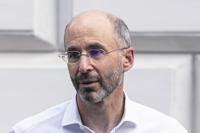CHICAGO (AP) ÔÇö A Minnesota university's decision to dismiss a professor for including depictions of the Prophet Muhammad in a world art course has put the small, private school at the center of a debate over how to include controversial material in college courses while respecting students' personal relationship to the material.
Months after the images were shown in an online class, the chair of Hamline University's Board of Trustees said Friday that the trustees were reviewing the universityÔÇÖs policies and its responses to both student complaints and faculty concerns about academic freedom. Also Friday, a national civil rights organization for Muslims .
The conflict began in October when adjunct professor Erika L├│pez Prater included a 14th-century painting depicting the Prophet Muhammad in a lesson on Islamic art, prompting a Muslim student in the class to complain to the university, according to media reports and advocacy groups that have backed either the professor or student.
L├│pez Prater was aware that for many Muslims, visual depictions of the Prophet Muhammad violate their faith. A course syllabus she has shown in media interviews noted that students would view images of religious figures, including the Prophet Muhammad. The syllabus also included an offer to work with students uncomfortable with viewing those images.
She also warned the class immediately before showing the depiction of the Prophet Muhammad. Her goal, L├│pez Prater said this week, was to teach students about the ÔÇťrich diversityÔÇŁ of attitudes toward such imagery.
ÔÇťIt's critically important that we acknowledge the internal diversity within Islam and that we also respect the keen, curious minds that come from that community and other groups and that we don't only accommodate the safest options available,ÔÇŁ she said in a Muqtedar Khan, a professor of international relations at the University of Delaware. ÔÇťInstitutions of higher learning ... we owe it to our students to challenge them in ways that are sometimes uncomfortable.ÔÇŁ
L├│pez Prater said she and her department chair began talking in September about her teaching a new course, but after the incident the chair told her that ÔÇťher services were no longer needed.ÔÇŁ
HamlineÔÇÖs president has said the professor's contract was not renewed following the fall semester.
Beyond Hamline's campus in Saint Paul, Minnesota, Muslims disagree about the incident and broader academic use of depictions of the Prophet Muhammad.
Jaylani Hussein, executive director of the Minnesota chapter of the Council on American-Islamic Relations, was among the earliest supporters of HamlineÔÇÖs response. He said the imageÔÇÖs inclusion in the lesson was disrespectful to Muslim students.
ÔÇťThat's a big part of why this hurtÔÇŁ the student who complained, he said.
At a news conference organized by the group, the student whose complaint sparked the universityÔÇÖs review said Wednesday that she and other Muslim students feel administrators acted appropriately. Aram Wedatalla told reporters that she had never seen a depiction of the Prophet Muhammad until the October class.
ÔÇťIt just breaks my heart that I have to stand here to tell people that something is Islamophobic and something actually hurts all of us, not only me,ÔÇŁ she said.
The national Council on American-Islamic Relations on Friday, though, distanced itself from claims that L├│pez PraterÔÇÖs approach was Islamophobic. CAIR, which describes itself as the largest civil rights organization for Muslims in the U.S., said intent, actions and circumstance all matter.
ÔÇťAlthough we strongly discourage showing visual depictions of the Prophet, we recognize that professors who analyze ancient paintings for an academic purpose are not the same as Islamophobes who show such images to cause offense,ÔÇŁ the organization said. ÔÇťBased on what we know up to this point, we see no evidence that Professor Erika L├│pez Prater acted with Islamophobic intent or engaged in conduct that meets our definition of Islamophobia.ÔÇŁ
Pushback to Hamline's decision began with an online petition from a University of Michigan Islamic art scholar who said the painting is frequently shown and studied by art historians and grew as media reports detailed the university's response, including one official's email to employees describing the incident as Islamophobic.
Critics included and the which both issued statements praising the professor for her sensitivity and commitment to teaching the variety of attitudes toward depictions of the Prophet Muhammad in Islam's history. Islamic art experts also have noted that the image was nothing like the cartoons in the satirical French newspaper that led to a deadly 2015 attack.
Those urging Hamline to reinstate L├│pez Prater include PEN America, the American Association of University Professors, as well as a former president of the university.
ÔÇťGenerations of Hamline faculty have taught with the belief that adhering to the bright line of academic freedom and supporting students are not mutually exclusive,ÔÇŁ Linda Hanson, who was Hamline's president from 2005-2015, wrote in a
University President Fayneese Miller staunchly defended the school's response, including a lengthy letter released Wednesday that said Hamline has been ÔÇťunder attack from forces outside our campus.ÔÇŁ
ÔÇťPrioritizing the well-being of our students does not in any way negate or minimize the rights and privileges assured by academic freedom,ÔÇŁ Miller wrote. ÔÇťBut the concepts do intersect."
Students also have rights that administrators must protect, she wrote, before citing the universityÔÇÖs ties to the United Methodist Church.
ÔÇťTo do all the good you can means, in part, minimizing harm,ÔÇŁ Miller said. ÔÇťThat is what has informed our decisions thus far and will continue to inform them in the future.ÔÇŁ
But a statement released Friday by Board of Trustees Chair Ellen Watters gave more credence to the school's critics, and promised that trustees ÔÇťare listening and we are learning.ÔÇŁ
ÔÇťThe Hamline University Board of Trustees is actively involved in reviewing the UniversityÔÇÖs policies and responses to recent student concerns and subsequent faculty concerns about academic freedom,ÔÇŁ Watters wrote. ÔÇťUpholding academic freedom and fostering an inclusive, respectful learning environment for our students are both required to fulfill our Mission.ÔÇŁ
The statement did not provide more detail on the board's process and a school spokesman did not immediately respond to messages seeking information.








































